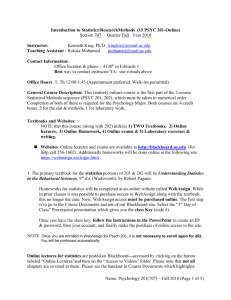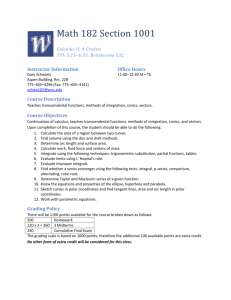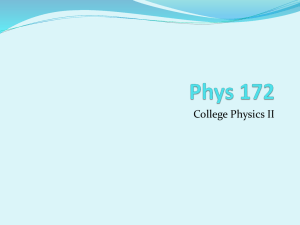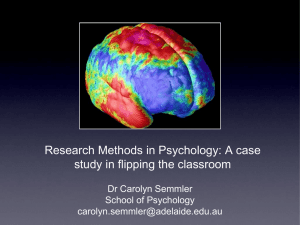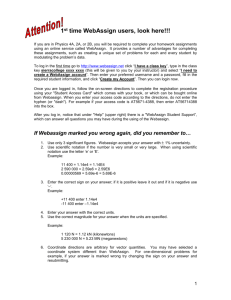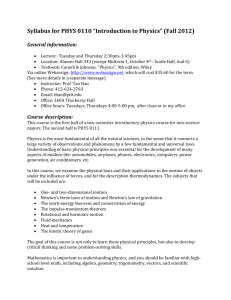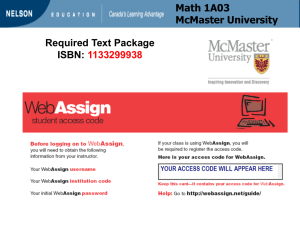Exams: Five exams will be posted as Assignments on Blackboard
advertisement
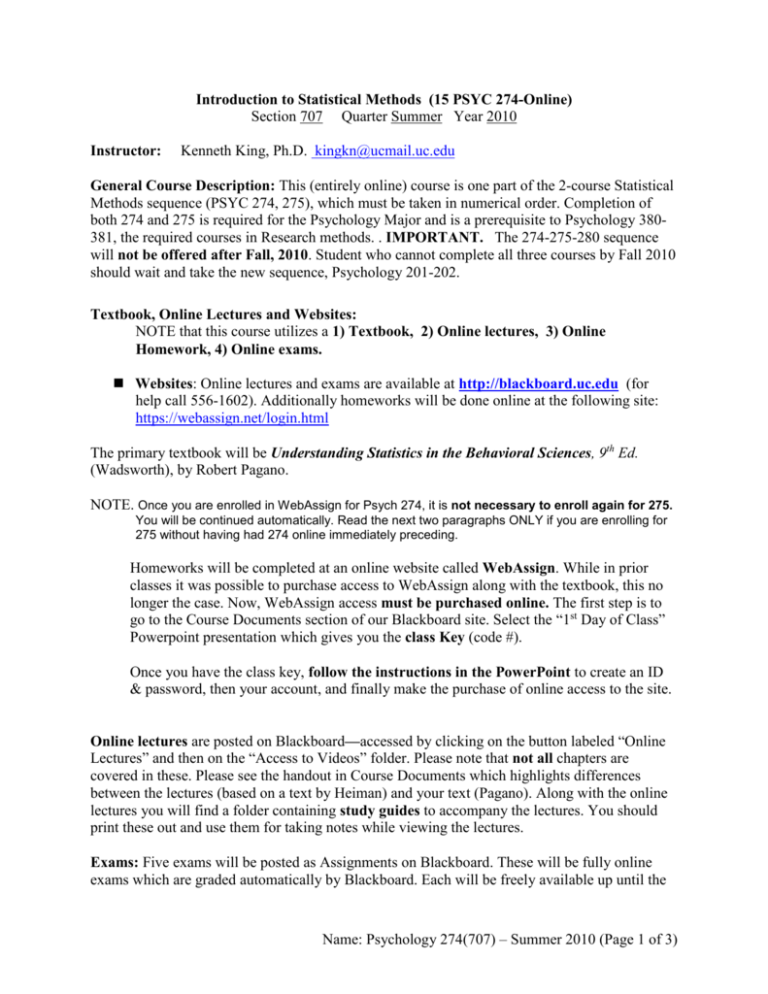
Introduction to Statistical Methods (15 PSYC 274-Online) Section 707 Quarter Summer Year 2010 Instructor: Kenneth King, Ph.D. kingkn@ucmail.uc.edu General Course Description: This (entirely online) course is one part of the 2-course Statistical Methods sequence (PSYC 274, 275), which must be taken in numerical order. Completion of both 274 and 275 is required for the Psychology Major and is a prerequisite to Psychology 380381, the required courses in Research methods. . IMPORTANT. The 274-275-280 sequence will not be offered after Fall, 2010. Student who cannot complete all three courses by Fall 2010 should wait and take the new sequence, Psychology 201-202. Textbook, Online Lectures and Websites: NOTE that this course utilizes a 1) Textbook, 2) Online lectures, 3) Online Homework, 4) Online exams. Websites: Online lectures and exams are available at http://blackboard.uc.edu (for help call 556-1602). Additionally homeworks will be done online at the following site: https://webassign.net/login.html The primary textbook will be Understanding Statistics in the Behavioral Sciences, 9th Ed. (Wadsworth), by Robert Pagano. NOTE. Once you are enrolled in WebAssign for Psych 274, it is not necessary to enroll again for 275. You will be continued automatically. Read the next two paragraphs ONLY if you are enrolling for 275 without having had 274 online immediately preceding. Homeworks will be completed at an online website called WebAssign. While in prior classes it was possible to purchase access to WebAssign along with the textbook, this no longer the case. Now, WebAssign access must be purchased online. The first step is to go to the Course Documents section of our Blackboard site. Select the “1st Day of Class” Powerpoint presentation which gives you the class Key (code #). Once you have the class key, follow the instructions in the PowerPoint to create an ID & password, then your account, and finally make the purchase of online access to the site. Online lectures are posted on Blackboard—accessed by clicking on the button labeled “Online Lectures” and then on the “Access to Videos” folder. Please note that not all chapters are covered in these. Please see the handout in Course Documents which highlights differences between the lectures (based on a text by Heiman) and your text (Pagano). Along with the online lectures you will find a folder containing study guides to accompany the lectures. You should print these out and use them for taking notes while viewing the lectures. Exams: Five exams will be posted as Assignments on Blackboard. These will be fully online exams which are graded automatically by Blackboard. Each will be freely available up until the Name: Psychology 274(707) – Summer 2010 (Page 1 of 3) due date. Three attempts (2 hours each) will be allowed—with the highest grade being the one which is counted. ALL exams must be completed. Each exam is worth 14% of your grade—for a total of 70% of your overall grade. Homework: Mastery of statistics can only be attained through practice and review. For this reason you will be asked to complete homeworks on the WebAssign site which accompanies your text. The problems that you work on there are designed for the text and will give you the same kind of practice that is found at the end of each chapter (which are recommended, but not required). Be sure to look in Course Documents for the “1st day” handout explaining how to use WebAssign. These homeworks can be worked on repeatedly (up to the due date) until you reach a score that you are satisfied with. The 9 homeworks will be worth 30 % of your grade. The grading is based on taking the homework and exam grades and weighting them appropriately (30/70). NOTE that this arrangement does NOT allow you to simply add up all of the points you see on Blackboard and then divide by the number possible. You need to calculate separate averages for homeworks and for the exams. Then, you multiply each average by 0.3 (HW) or 0.7(XM) and then add those subtotals. Once this overall average is calculated, the grading below is used (with + and – designations). 90 – 100% A 80 – 89% B 70 – 79% C 60 – 69% D Below 60% F Schedule (due dates) Mon. June. 21, 2010 Course begins. Read Chaps. 3 & 4 View Online Lectures (Modules 2-4) Begin work on WebAssign homeworks 3 & 4 Thurs. June 24 (midnight) Webassign Ch. 3 HW due Fri. June 25 (midnight) Webassign Ch. 4 HW due Sat. 26 (midnight) Exam 1 on Chs 3-4 on Blackboard due Read Ch 5. View online lecture (module 5) Begin WebAssign HW Chap. 5 Tues. June 29 (midnight) Ch. 5 HW due Wed, June 30 (midnight) Exam 2 on Chap. 5 Begin reading Chaps. 6 & 7; View module 6 Sat. July 3 (midnight) WebAssign Ch. 6 HW due Work on Ch. 7 HW Mon. July 5 (midnight) Exam 3 on Chaps 6 & 7 WebAssign Ch. 7 HW due Name: Psychology 274(707) – Summer 2010 (Page 2 of 3) Thurs. July 8 (midnight) Fri. July 9(midnight) Read Ch. 8 (not covered in online lectures) Ch. 8 HW due.Read Ch. 9 (not covered in online lecture) Ch. 9 HW due Sat. July 10 (midnight) Exam 4 on Chs. 8 & 9 Read Ch. 10 (not covered in online lectures) Mon. July 12 (midnight) Ch. 10 HW due. Read Chapter 11 (not covered in online lectures) Tues. July 13(midnight) Ch. 11 HW due Wed, July 14 (midnight) Exam 5 (Chaps 10-11) END OF COURSE (Psych 275 begins next day) Pass/Fail Option, Audit Policy, and Withdrawal Policy: Should a student wish to take the course pass fail he/she obtains a "pass fail" form from the A&S office. The completed form is returned to the college which forwards it to the student records office. Please note that the decision to take a course pass fail is binding. The student taking the course pass/fail is expected to do all of the work performed by graded students. Indeed, the instructor will give "A", "B", "C", D" or "F" grades on individual assignments in order to determine the final grade. Only work of "C" or better quality will result in an "S" grade. Academic Integrity: The University Rules, including the Student Code of Conduct, and other documented policies of the department, college, and university related to academic integrity will be enforced. Any violation of these regulations, including acts of plagiarism or cheating, will be dealt with on an individual basis according to the severity of the misconduct. Special Needs: If you have any special needs related to your participation in this course, including identified visual impairment, hearing impairment, physical impairment, communication disorder, and/or specific learning disability that may influence your performance in this course, you should meet with the instructor to arrange for reasonable provisions to ensure an equitable opportunity to meet all the requirements of this course. At the discretion of the instructor, some accommodations may require prior approval by Disability Services. This syllabus is subject to possible modification. Name: Psychology 274(707) – Summer 2010 (Page 3 of 3)
